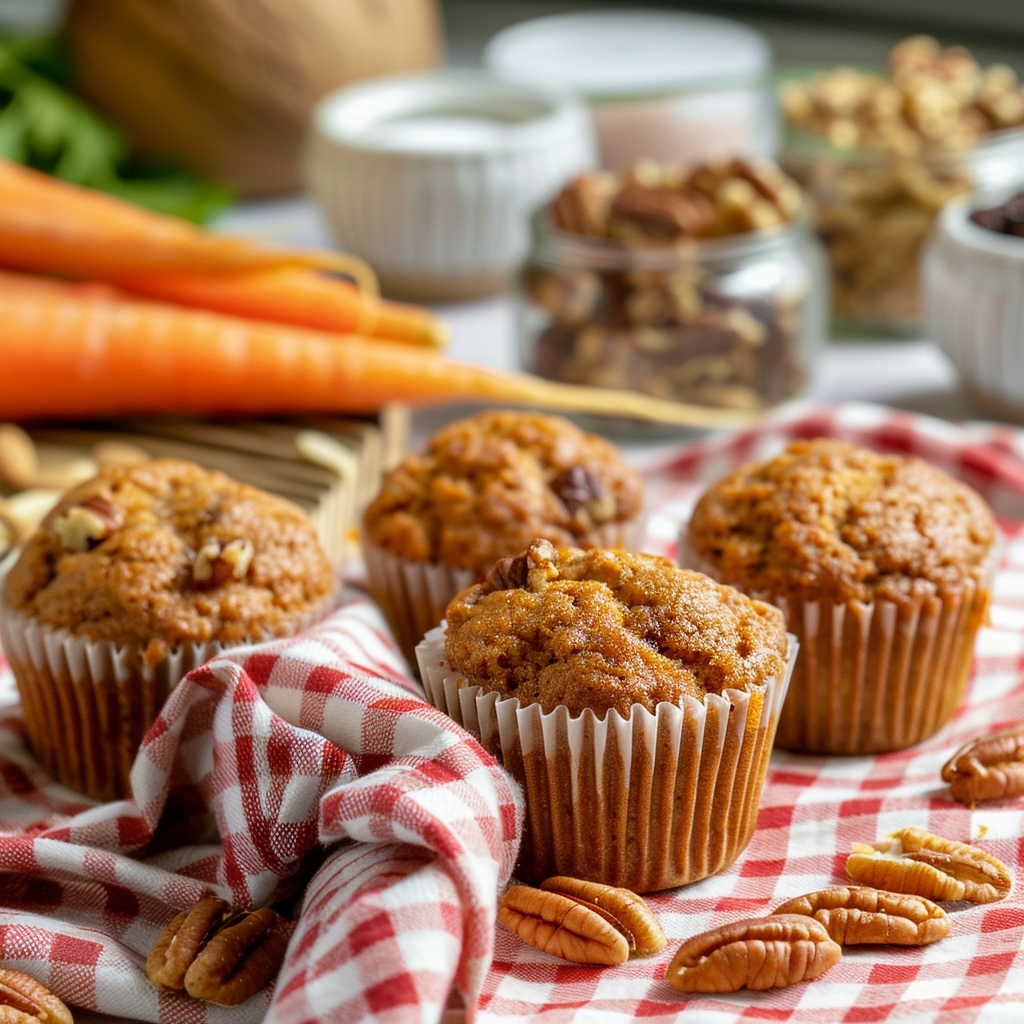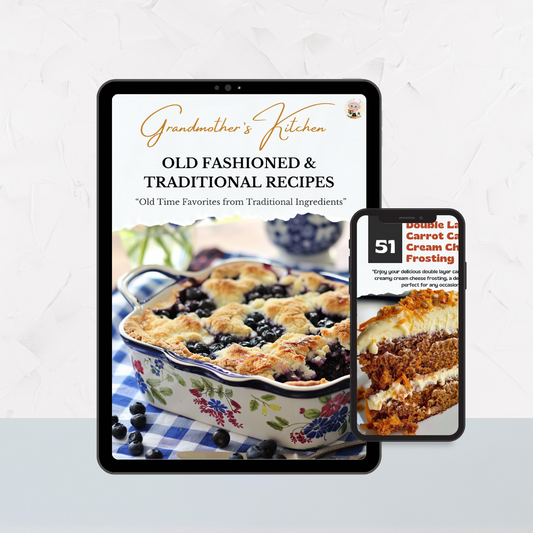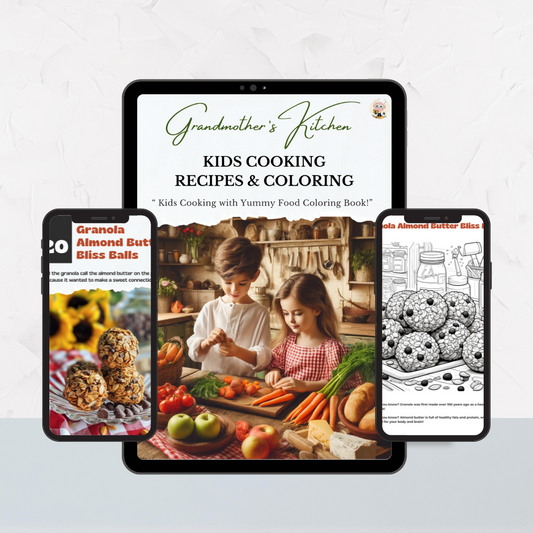Healthy Carrot Muffins with Pineapple – Perfect for Lunchboxes & Hikes

Share
The Joy of Healthy, Delicious Snacks for Lunchboxes and Hikes
I am always on the lookout for nutritious and tasty options for muffins. I stumbled upon this carrot muffin recipe that quickly became a favorite. Not only do these muffins make for a delicious midday snack, but they’re also packed with nutrients. I discovered that these muffins are also an ideal snack for my hikes. I love taking them along on my outdoor adventures because they’re easy to pack, satisfy my hunger, and give me the boost I need on the trails. Knowing that they’re filled with wholesome ingredients like carrots, nuts, and spices makes them a choice I feel good about. Whether for a snack at home, or to pack on a hiking trip, these muffins are a versatile and nutritious option.
Did You Know?
Carrot muffins are a delicious way to incorporate more vegetables into your diet, especially for those who might not be fond of eating raw carrots. Carrots are rich in beta-carotene, fiber, vitamin K1, potassium, and antioxidants. They are known for their health benefits, including improving eye health, aiding in digestion, and providing essential nutrients for overall well-being. These muffins often include warming spices like cinnamon and nutmeg, which complement the natural sweetness of the carrots. Adding nuts or raisins can provide additional texture and flavor, making these muffins a versatile and nutritious treat.
Yield: 12 Muffins
Ingredients:
1 1/2 cups all-purpose flour
1 teaspoon baking soda
1 teaspoon baking powder
1/2 teaspoon salt
1 teaspoon ground cinnamon
1/4 teaspoon ground nutmeg
2 large eggs
1/2 cup vegetable oil or melted butter
1/2 cup brown sugar
1/4 cup honey
1 teaspoon vanilla extract
1 1/2 cups grated carrots
1/2 cup crushed pineapple, drained
1/2 cup chopped walnuts or pecans (optional)
1/2 cup raisins (optional)
Instructions:
Prepare the Batter:
Preheat your oven to 375°F (190°C). Grease a 12-cup muffin tin or line with paper liners.
Personal Tip: Pre-grated carrots can dry out, so I always grate mine fresh for the best texture and flavor.
In a large mixing bowl, whisk together the flour, baking soda, baking powder, salt, cinnamon, and nutmeg.
Personal Tip: For added moisture, I sometimes swap out half the oil for unsweetened applesauce. It adds a hint of sweetness and keeps the muffins tender.
In another bowl, beat the eggs, oil, brown sugar, honey, and vanilla extract until well combined.
Personal Tip: Drain the crushed pineapple well to prevent excess moisture in the batter, which can make the muffins soggy.
Stir the wet ingredients into the dry ingredients until just combined. Fold in the grated carrots, crushed pineapple, nuts, and raisins if using.
Bake the Muffins:
Divide the batter evenly among the prepared muffin cups, filling each about two-thirds full.
Personal Tip: For even baking, I like to rotate the muffin tin halfway through the baking time.
Bake in the preheated oven for 18-20 minutes, or until a toothpick inserted into the center of a muffin comes out clean.
Personal Tip: Test the muffins with a toothpick to ensure they’re done—if it comes out clean, they’re ready!
Cool:
Allow the muffins to cool in the tin for a few minutes before transferring them to a wire rack to cool completely.
Personal Tip: Letting the muffins cool in the tin for a few minutes before transferring to a wire rack helps them set up nicely.
Serve:
Serve warm or at room temperature. These muffins are delicious on their own or with a light spread of cream cheese.
Personal Tip: These muffins are delicious on their own or with a light spread of cream cheese for a little extra indulgence.
Nutritional Information (Per Muffin):
Calories, 250; Fat, 12g; Saturated Fat, 2g; Carbohydrates, 32g; Fiber, 2g; Sugars, 18g; Protein, 4g
Kitchen Tips, Great Ideas, How to Save Money
-
Bulk Buying: Purchase carrots, flour, and baking supplies in bulk. These ingredients are staples in many baking recipes, and buying in bulk can reduce the overall cost. Store them in airtight containers to keep them fresh and ready for use.
-
Homemade Carrot Purée: If you have extra carrots, consider making carrot purée to use in various recipes, including these muffins. Simply steam the carrots until soft and blend them into a smooth purée. This can be a cost-effective way to use up carrots before they spoil.
-
Dairy Alternatives: If you prefer a dairy-free option, use non-dairy milk such as almond, soy, or oat milk. These alternatives often have a long shelf life and can be used in various recipes, making them a versatile choice.
-
Homemade Muffin Liners: Make your own muffin liners using parchment paper. Cut squares of parchment paper and press them into the muffin tin, creating a rustic look. This saves money and reduces waste.
-
Reusable Baking Tools: Invest in reusable silicone muffin cups. These cups are non-stick, easy to clean, and environmentally friendly. They also save money over time compared to disposable paper liners.
-
Energy Efficiency: Bake multiple batches at once to make the most of your oven’s heat. This not only saves energy but also allows you to have extra muffins on hand for the week. Freeze any extras in an airtight container for future use.
-
DIY Nut Flour: If you use nut flour frequently, consider making your own by grinding nuts in a food processor. This can be more cost-effective than purchasing pre-ground nut flour and allows you to control the texture.
-
Smart Storage: Store leftover muffins in an airtight container at room temperature for up to three days. For longer storage, freeze the muffins individually wrapped in plastic wrap and then placed in a freezer bag. Reheat in the oven or microwave for a quick and easy snack.
-
Ingredient Substitutions: If you’re out of vegetable oil or butter, use applesauce or mashed bananas as a substitute. These alternatives not only save money but also add a unique flavor and extra moisture to your muffins.
-
Learning and Sharing: Engage with online baking communities for more tips and recipe ideas. Sharing your experiences and learning from others can make baking more enjoyable and economical. You can discover new techniques, ingredient substitutions, and creative ways to use pantry staples.
Let’s Learn About Different Kinds of Carrots
Carrots come in a variety of colors and types, each offering unique flavors and nutritional benefits. The most common variety is the orange carrot, known for its high beta-carotene content, which the body converts into vitamin A for healthy vision and immune function. Purple carrots contain anthocyanins, powerful antioxidants that give them their vibrant color, while yellow and white carrots are slightly milder in flavor but still packed with essential nutrients. Carrots are also available in heirloom varieties, which may have different shapes, sizes, and flavors. Each type of carrot offers a unique taste, so experimenting with different kinds can add variety to your meals and snacks.


